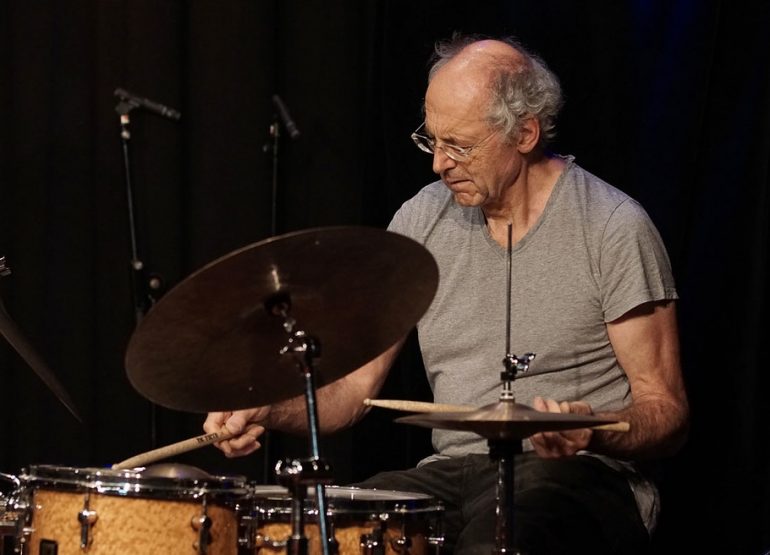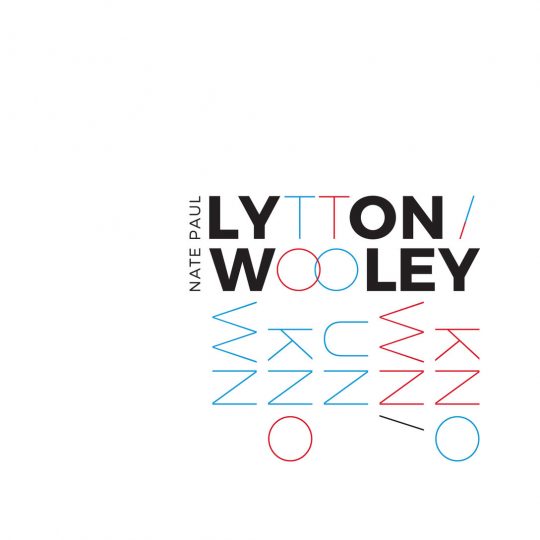Paul Lytton was born in London on March 8, 1947. Drummer, also known for his experiments with electronics, constructor of instruments. His drummer career began with … playing in dance big bands in the 1960s. In those years he also likes to listen to Elvin Jones or Tony Williams, but he starts to deal with free music as a result of a meeting with Tony Oxley – a guy who on the one hand had a permanent engagement with Ronnie Scott’s – the most popular British jazz club, on the other hand he played with Derek Bailey. Through Tony he meets Evan Parker, with whom he soon records in a duo (Collective Calls (Urban) – 1972 Incus). Soon the double bass player Barry Guy will join these two and this meeting will prove crucial not only for Paul Lytton’s career but also for the history of European improvised music.
Lytton is a drummer who rarely comes to the fore (announcing his 50th birthday concert, Evan will say „Today may be the time for Paul Lytton to play some solo, but not necessarily”). He doesn’t really lead his own bands, the vast majority of the over 120 recordings he has taken part in have their source in the Parker / Guy / Lytton trio.
This line-up is probably the longest-established, continuous recording freejazz ensemble in the world, along with Alexander Schlippenabach’s Trio. Their music can be considered without hesitation as a European model of the genre. Starting from the first album (Tracks – Incus 1982) to the newest (Live At Maya Recordings Festival – No Business Records 2013), the discography of the trio consists of nearly 20 albums. It is impossible to know all of them, but one cannot limit oneself to one. It should be added that they willingly invite guests to cooperate with them – the documented meetings with Gorg Lewis, Marilyn Crispell (twice), Peter Evans or the aforementioned trio Schlippenabacha (Evan Parker is a common element of both groups).
All three also play in the London Jazz Composers Orchestra led by Barry, the first recording being the 1972 Ode (Incus). Again, it is impossible to limit oneself to one album, but one cannot omit the wonderful „Harmos” recorded in 1989 for Intakt Records (in 2012 another performance of the composition also on DVD).
The Evan Parker Electro Acoustic Ensemble, which released between 1997 and 2009, released 5 highly intriguing albums for the famous ECM Records, is a further development of the trio’s cooperation. The musical concept is based on a clash of acoustic instruments (Phillip Wachsmann joins the trio) and electronic real time transitions (Marco Vecchi, Walter Prati and Paul Lytton are responsible for them on the first album „Toward The Margins”).
Recordings of Paul Lytton and Barry Guy in a trio with Marilyn Crispell are also a part of the album. These are just three but excellent albums – Odyssey (2001), Ithaca (2004) and after years of Deep Memory (2016), all for Intakt Records. The juxtaposition of Parker/Guy/Lytton and Crispell/Guy/Lytton will also be the basis for the new Barry Guy New Orchestra. Krakow’s audiences will probably still have a vivid recollection of Alchemia’s two-time residence as part of the Jazz Autumn Festival (whose multi-record documentation is available on Not Two’s Mad Dogs boxes).
Although always in close connection with the London scene, since 1975 Lytton has lived in Belgium, where he founded the Po Torch label with Paul Lovens. Over the years, he has enjoyed recording duos – besides the aforementioned recordings with Evan Parker or Lovens, he has also collaborated with Wachsmann and recently with Nat Wooley. In 1999, a duo album with Ken Vandermark – English Suites (label Wobbly Rail) was released, which gave rise to a few years of cooperation with an American saxophonist. It will be continued by recording in trio with Phillip Wachsmann and subsequent incarnations of Vandermark’s large line-up – Territory Band. I especially recommend Collide – the 6th and last album recorded with guest appearances by Fred Anderson.
Paul Lytton rarely appears in front of the stage, more willingly remains behind, in the background. But you don’t become one of the most important drummers of the European free scene by accident – Lytton’s playing is devoid of ego, but is filled with colors, rich texture, contrast to the point, attention to the smallest sound detail. It may be difficult to recall Lytton’s playing on stage, but the concerts and music he plays are unforgettable.


